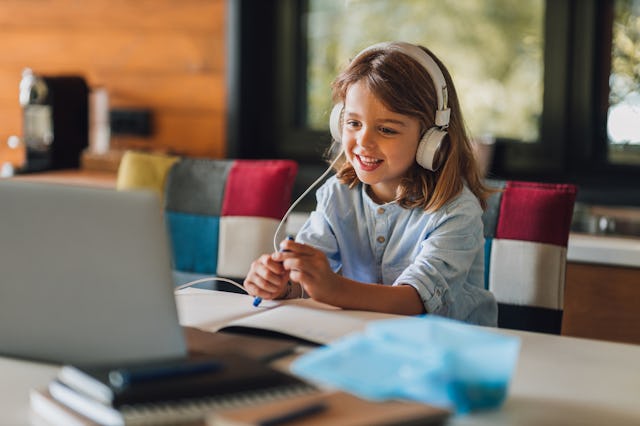Are Audiobooks Bad For A Child's Brain Development?
Two experts break down the audiobook vs. physical book debate.

If you genuinely cannot handle yet another car trip soundtracked to "Baby Shark" or the Cocomelon version of "Wheels on the Bus," audiobooks for kids or e-books on a tablet might sound like a great way to shake things up and help keep your sanity in check.
You already know how crucial reading is to your child's cognitive development, especially when they're in the baby and toddler years. But you might be curious if listening to books (or even kid-friendly podcasts) has the same impact.
Turns out, there are some serious brain benefits to both physical books and audiobooks, which means audiobooks are a great way to keep kids engaged and entertained when you're on the go, while reading text-based or picture books with them is still a solid way to bond with your little one at home (or anytime, really).
It's True: Reading Is Fundamental
First, two pros offer a quick refresher on how reading lights up the brain. "Reading engages several areas of the brain, including the visual cortex (the part responsible for processing visual information), Wernicke's area (which is involved in language comprehension), and Broca's area (which is involved in language production)," as Sophie Andrea, the founder of Dialogue Books, tells Scary Mommy.
The earlier you adopt a regular reading habit, the better, adds Dr. Anjali Ferguson, a clinical psychologist and the founder of Parenting Culture. "Children can benefit from being read to from birth. Reading with your child also has several benefits for attachment and bonding with caregivers. It can reduce stress and improve the parent-child relationship. Not only does reading with your child impact bonding and connectedness, but it also helps expand their early language development, exposes them to new information, expands curiosity, and builds phonological processing, which is critical for later reading skills."
Specific Benefits
Andrea says that audiobooks offer several advantages.
- Improved listening skills: "Audiobooks can help develop a child's listening skills and ability to focus on spoken language," she notes.
- Increased comprehension: "For some children, especially those with learning disabilities or difficulty with reading, audiobooks can aid in comprehension," she says.
- Exposure to new vocabulary: "Listening to a narrator pronounce new words and using them in context can help children build their vocabulary," she adds.
- Enhancing imagination: "Audiobooks may stimulate children's imagination as they visualize the story in their minds," she says.
Physical books, on the other hand, provide their own benefits, says Andrea.
- Improved reading skills: "Reading physical books can help children develop their reading fluency, decoding, and comprehension skills," she says.
- Better understanding of text structure: "Physical books provide exposure to grammar, sentence structure, and punctuation, which is essential for language development," she adds.
- Enhanced focus and concentration: "Reading requires focus and attention, which can help develop children's concentration skills," she notes.
- Development of visual processing: "Reading physical books helps children recognize words, letters, and patterns, which strengthens their visual processing abilities," she says.
But Which Type of Book Is Better?
While both pros agree that audiobooks and physical books provide different — but equally important — developmental benefits for little ones, Ferguson notes that there's truly no substitute for reading actual books during story time, especially when you've got a baby or a tot on your hands.
"Several new studies identify greater benefits to physical picture books than audiobooks or e-books," she says. "Brain science shows that children exposed to audiobooks have trouble managing the audio and visual information simultaneously. As such, children activate less of the visual receptors in the brain to accommodate for the audio information. Additionally, due to limited environmental exposure to information in early development (i.e., they have not seen a lot of the world), children learn best when accompanying pictures they can reference repeatedly. Physical stimuli helps them engage with the material more, which impacts learning."
And while tablet-based books with or without an audio component certainly are convenient, reading out loud to your little one is still the best move whenever possible. "Another concern is that children who do not receive the brain development of visual regions associated with reading in early childhood may have difficulty engaging with chapter books and/or books with less visual information as they get older because they're not as stimulating as video books," says Ferguson. Essentially, the more exposure to screens they get from the start might lead them to feel bored or understimulated by hard-copy books as they grow.
Still, if you're traveling or out and about, you can't go wrong with any type of book that's accessible, says Andrea. "Both formats offer unique benefits for neural and cognitive functioning. Ultimately, it depends on the child's individual needs, preferences, and learning style."
Ferguson agrees, noting that each child will have different methods that work best for them. "Audiobooks can still be an effective learning tool," she says. "Continue to provide physical books as part of their day; however, it is important to remember that all children learn differently (i.e., neurodivergent children might thrive with video formats of learning), and some children have limited access to physical books (i.e., under-resourced families)."
"What is important is the exposure to reading from an early age," she continues. "Several studies document language and cognitive disparities in marginalized children due to their lack of exposure to early reading (it's called the 30-million-word gap). Reading ultimately lays the foundation for language development and later educational outcomes, so exposure to reading/language in any form is preferred to no reading at all."
The *ahem* TL;DR here, per Andrea: "Both audiobooks and physical books offer benefits for neural and cognitive functioning in children. To support a child's overall development, it's important to expose them to both formats. Encouraging a mix of reading and listening can help build a range of skills and create a more well-rounded learning experience."
This article was originally published on